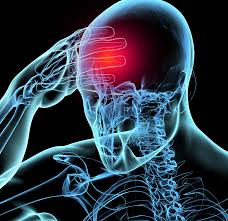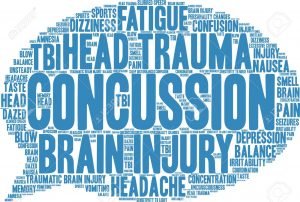
 Concussions and the symptoms associated with head trauma have been the topic of discussion
Concussions and the symptoms associated with head trauma have been the topic of discussion
more frequently in the media over the past few years. Head and neck trauma are a surprisingly
common occurrence in sporting activities, however, they are not only limited to professional
football players. Research is beginning to show that athletes of all ages are not only
experiences severe neurological impairments from concussions, but also studies are
demonstrating that it may even take longer for younger athletes to fully recover from
concussions (1).
What is a Concussion?
A concussion is considered to be a type of injury to the brain and head area that can be caused
by an impact to the head, or indirectly to the body that can cause the head and neck to move in
a severe manner similar to a whiplash injury commonly associated with motor vehicle
accidents. This rapid whiplash-like movement causes the brain to effectively bounce around in
the skull which leads to neuronal damage, inflammation, and possible cognitive impairment (2).
Signs and Symptoms of a Concussion
An important thing to remember when assessing the signs and symptoms of a head/neck injury
in that often times the symptoms may not show themselves for hours, days, or even weeks
post-concussion. However, most often the concussed individual will realize immediately that 
something may be wrong. Commonly, headaches and neck pain (stiffness) start to occur. If
symptoms continue to get worse, one must consider seeking out professional evaluation.
Other symptoms to look out for include: nausea, vomiting, dizziness, balance issues, sensitivity
to light, and mood/behavior changes.
Severe blows to the head may result in more serious symptoms such as bleeding in the brain
which must be sent to the ER as soon as possible. Other serious signs to look out for include:
convulsions, seizures, worsening headache, and slurred speech. It’s better to be safe than
sorry!
What Should You Do?
After suffering a concussion it is important to remember that the brain, head, and neck need
time to recover and rest. Avoiding physical activity for a minimum of a few days is highly recommended. Refraining from activities such as reading, watching a screen, studying,
staying up late will only help the body begin the healing process. A diet full of anti-
inflammatory foods, including Omega-3 Fatty Acids, will provide ample support for the brain
and neurons. Besides receiving a thorough evaluation, the athlete needs to slowly progress
back into full activity. Various neurocognitive testing must be done to assess the central
integrative state of the nervous system. Typically it takes no fewer than 5-7 days to be fully
cleared. The most important thing to remember is to monitor your body for any
signs/symptoms, and to immediately cease activity if symptoms begin to occur.
Concussions are extremely serious and should be treated with professional care. If you or
someone you know may have a concussion it is important to be evaluated by a doctor that
works with head/neck trauma. If you have any questions feel free to contact us at
k2healthcenter.com or call 760-456-9470.

Monday & Thursday:
10am - 1pm | 3pm - 6pm
Tuesday & Wednesday:
8:30am - 11:30am | 1:30pm - 4:30pm
Friday, Saturday, Sunday:
CLOSED